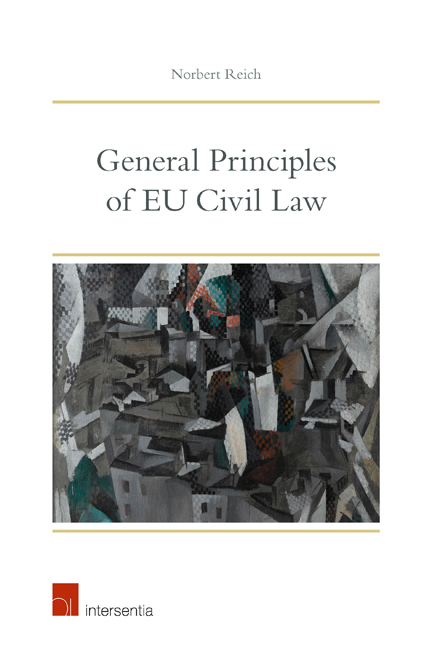Book contents
- Frontmatter
- Preface
- Contents
- Table of ECJ cases: alphabetical
- Table of ECJ cases: chronological
- Table of EU legislation
- List of abbreviations
- Introduction. What are General Principles of EU Civil Law?
- Chapter 1 The Principle of “Framed” Autonomy
- Chapter 2 The Principle of Protection of the Weaker Party
- Chapter 3 The Principle of Non-Discrimination
- Chapter 4 The Principle of Effectiveness
- Chapter 5 The Principle of Balancing
- Chapter 6 The Principle of Proportionality
- Chapter 7 An Emerging Principle of Good Faith and of a Prohibition of Abuse of Rights?
- Summary. Seven Theses and a Conclusion
- Index
Introduction. What are General Principles of EU Civil Law?
Published online by Cambridge University Press: 22 November 2017
- Frontmatter
- Preface
- Contents
- Table of ECJ cases: alphabetical
- Table of ECJ cases: chronological
- Table of EU legislation
- List of abbreviations
- Introduction. What are General Principles of EU Civil Law?
- Chapter 1 The Principle of “Framed” Autonomy
- Chapter 2 The Principle of Protection of the Weaker Party
- Chapter 3 The Principle of Non-Discrimination
- Chapter 4 The Principle of Effectiveness
- Chapter 5 The Principle of Balancing
- Chapter 6 The Principle of Proportionality
- Chapter 7 An Emerging Principle of Good Faith and of a Prohibition of Abuse of Rights?
- Summary. Seven Theses and a Conclusion
- Index
Summary
AN ONGOING DEBATE: “PRINCIPLES” VS. “RULES”
“General principles” of EU law have long been recognised as part of unwritten law. They have been developed in a constant flow of case law of the now called Court of Justice of the EU (CJEU or simply ECJ) which takes its mandate from Article 19(1) TEU whereby “[i]t shall ensure that in the interpretation and application of the Treaty the law is observed.” The law – das Recht – le droit – this formula was to be found already in the original EEC Treaty, and was taken over by what later became the EC Treaty after Amsterdam (Article 220 EC) and has not changed its wording in the latest Lisbon version. However, its “upgrading” from what is now called the Treaty on the Functioning of the EU (TFEU), formerly the EC Treaty, to the Treaty on European Union (TEU) containing the basic principles and institutions of the Union itself, shows its high standing and importance in the political and legal order.
The formula deliberately goes beyond a mere positivist concept of law. It obviously refers to the sources of the EU Treaties as “primary law” – now including the Charter of Fundamental Rights (the Charter) according to Article 6(1) TEU – and secondary law in the sense of Article 288 TFEU, namely regulations, directives and decisions. “General principles” seem to be in an “intermediary location” – something between primary and secondary law, even though they are, in the words of the ECJ, of constitutional relevance. A number of such general principles – mostly relating to constitutional and administrative law – have been developed, described and analysed in the fundamental study of Tridimas. They seem to be generally accepted by the ECJ, by its AGs, and by scholarship, even though there may be debates about their origin, scope and exact legal nature. However, principles of constitutional or administrative law will not be this book's focus, but rather principles of EU civil law.
- Type
- Chapter
- Information
- General Principles of EU Civil Law , pp. 1 - 16Publisher: IntersentiaPrint publication year: 2013

